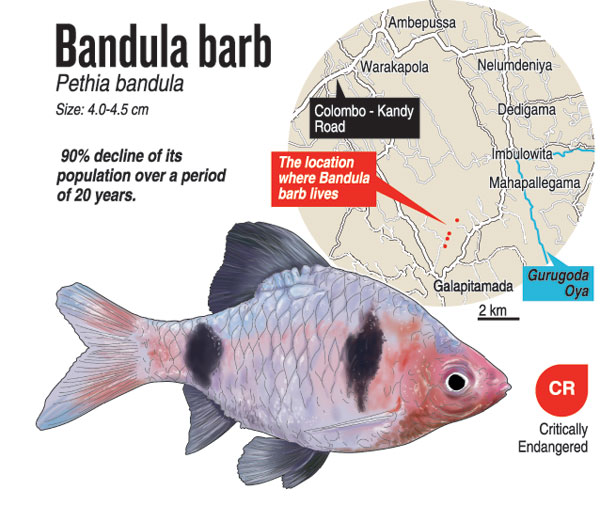News
The disappearing Bandula barb’s hilly home range protected
View(s):By Malaka Rodrigo
To mark World Environment Day on June 5, the Sri Lankan government has declared an Environment Week starting from May 30. The highlight of this initiative, according to Environment Minister Dr. Dammika Patabandi, is the declaration of five environmentally sensitive areas as protected zones. Among the areas to receive new protections are the Kottawa Forest in the Galle District, the Nilgala Forest in Monaragala, and two forests in the Kegalle District. Notably, a small but ecologically vital stretch of stream in Galapitamada, Kegalle, will also be designated a sanctuary to protect one of Sri Lanka’s rarest freshwater fish — the Bandula Barb (Pethia bandula).
Endemic to Sri Lanka, the Bandula Barb is found nowhere else on Earth. This small, reddish-gold fish is distinguished by two black vertical bars — one behind its gill cover and the other near its tail. It was first identified in 1990 during a study by renowned ichthyologist Rohan Pethiyagoda. The species was originally thought to be a hybrid, but later research by Pethiyagoda and Swiss fish taxonomist Maurice Kottelat confirmed it as a distinct species. The fish was named Pethia bandula in honor of Ranjith Bandula, the ornamental fish collector who first brought it to scientific attention.

The Bandula Barb is restricted to a roughly 3-kilometer-long stream segment that originates from a hillock north of Rabbedigala village and flows through Rabbedigala, Hapugoda, and Minipura before draining into the Gurugoda Oya — a tributary of the Kelani River. Even at the time of its discovery, the species was in steep decline. In the 1980s, researchers could catch up to 100 individuals per hour in this stream. By 1990, that figure had plummeted to just 14, suggesting a 90% drop in population within a decade.
This alarming decline triggered immediate concern among conservationists. Subsequent research by Hasula Wickremasinghe of the Biodiversity Secretariat further documented the species’ precarious status. A formal recovery plan was developed under the guidance of Prof. Devaka Weerakoon, involving the Biodiversity Secretariat, the Department of Wildlife Conservation, and the International Union for Conservation of Nature (IUCN). Legal protection under the Fauna and Flora Protection Ordinance soon followed, making the Bandula Barb the first freshwater fish in Sri Lanka to be granted such status.
Multiple attempts have been made to establish new populations outside the original stream. In 2001, 250 pairs of Bandula Barbs were introduced into two streams within the Kelani River basin in Salgala, not far from their native range. However, this effort was unsuccessful, likely due to unsuitable ecological conditions or the presence of competing fish species. A more cautious translocation effort later released 20 individuals into a carefully selected stream within the same region. Concerns about hybridisation with similar species were carefully addressed during this process. Encouragingly, this second introduction succeeded, with the population increasing to several hundred individuals over time.
Despite the success of the secondary population, scientists emphasise the importance of preserving the species’ original habitat. “Protecting the native stream is crucial,” says Ramani Shirantha, a senior scientific officer at the National Aquatic Resources Research and Development Agency (NARA). On a recent visit, Dr. Shirantha observed ongoing road construction near the stream, causing significant habitat disruption. “The clearing of streamside vegetation for agriculture and infrastructure leads to erosion, sedimentation, and a change in the natural flow — all of which threaten the Bandula Barb’s breeding and feeding grounds,” she noted.
Pollution adds to the mounting pressure. Runoff from surrounding agricultural lands carries pesticides and fertilisers into the stream, altering water chemistry and potentially proving lethal to the fragile fish population. Scientists fear that any severe contamination could wipe out the remaining wild population entirely.
Given these ongoing threats, the government’s decision to declare the Bandula Barb’s habitat a sanctuary is being welcomed by conservationists. However, experts caution that legal protection alone is not enough. Effective management, regular monitoring, and community involvement are essential to ensure the species’ long-term survival.
The story of the Bandula Barb is a poignant reminder of how vulnerable freshwater ecosystems are — and how quickly unique species can vanish if action is not taken in time. As Sri Lanka marks Environment Week, the fate of this tiny fish may serve as both a cautionary tale and a beacon of hope for freshwater conservation.
The best way to say that you found the home of your dreams is by finding it on Hitad.lk. We have listings for apartments for sale or rent in Sri Lanka, no matter what locale you're looking for! Whether you live in Colombo, Galle, Kandy, Matara, Jaffna and more - we've got them all!

